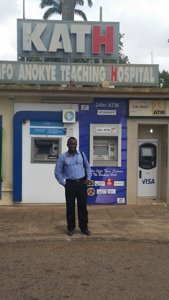In chaos theory, the butterfly effect is captured metaphorically by the story that a butterfly flapping its wings on one side of the world causes a raging typhoon on the other side. For example, recent viral outbreaks of Ebola virus disease in 2015 — and Zika virus this year — originated in countries far outside the United States. Yet ripples of these epidemics reached the shores of North America almost overnight, with devastating consequences in some cases.
From a global health perspective, crises like the above underscore the need for greater intercontinental collaborations. Embracing this ethos could potentially help institutions like Johns Hopkins move closer to achieving its bold mission: to improve the health of the world. One way Johns Hopkins can keep on track with this promise is to invest in training leaders poised to tackle this challenge. Those leaders could in turn train others to effect change on a transcontinental scale.
Last summer, I received an award from the Johns Hopkins Center for Global Health to travel to the Komfo Anokye Teaching Hospital (KATH) in Ghana. My goal was to gain a better understanding of gaps in physiatry care within the local health system and to look for opportunities to collaborate on starting a new physiatry training program in Ghana.

At Johns Hopkins, my training presented opportunities for me to work with expert clinicians and researchers, yet translating these skills from a technology-rich environment to a less-endowed one was daunting. I was immediately struck by the similarities and contrasts. Like in the U.S., the medical teams in Ghana rounded on their patients in the mornings. However, very rarely did the team order expensive imaging tests; diagnoses were based solely on history, physical examination and the physician’s clinical acumen.
Due to a dearth of resources, the physicians at KATH had figured out a way to do much with very little. Contrast this with the United States, where inordinately high costs of diagnostic tests contribute to an untenable and broken health care system. To spark a new wave of global health collaborations, physicians in Ghana could leverage cost-saving innovations in exchange for cutting-edge technologies from the West. Health systems in the U.S. could learn from low-resource environments how small changes in practice can transform the cost of care.
Johns Hopkins offers the promise of medicine — the right care for the right patient at the right time. But this promise isn’t found in all hospitals. My encounter with a patient I’ll refer to as John (his name has been changed to protect his privacy), a 4-year-old patient on the KATH pediatric ward in Ghana, solidified this observation. John had recently had his legs amputated below the knee and developed a slew of complications. On top of that, there were no prostheses available for him after his amputation. There were also no rehabilitation facilities and no physiatrists, so postoperatively, he developed severe contractures, progressively becoming debilitated and disabled. The lead physician, Adabie Appiah, who had started a foundation to help kids like John, asked me if there was anything I could offer this child.
Had John been a patient at Johns Hopkins, he would have seen a physiatrist, who would lead his functional recovery. But alas, he found himself in a place where his options were limited. Unfortunately, John's case is not an exception. Sub-Saharan Africa has 78 million people with a disability and only six physiatrists — a major gap in care. Institutions like Johns Hopkins can take the lead in helping fill this gap by training future physiatrists and leaders in global health. Over time, these trainees can cause an ocean of change.
On returning to the U.S. at the end of the summer, I developed a deeper appreciation for the privilege of training at a first-class hospital. My experience in Ghana gave me pause to reflect about the many ways in which Johns Hopkins Medicine has a very unique opportunity to expand the promise of medicine globally to the many “Johns” all over the world. The staggering need for rehabilitation medicine experts in sub-Saharan Africa demands leadership and change in this arena. If chaos theory is anything to go by, perhaps initiating this massive change may take just a bit of wing flapping.
Related Content
Visit Johns Hopkins Medicine International to learn more about global health initiatives at Johns Hopkins Medicine.
Johns Hopkins Surgeon: Kofi Boahene's Story
Watch to learn more about Dr. Boahene's journey from Ghana to practice medicine at the Johns Hopkins Hospital